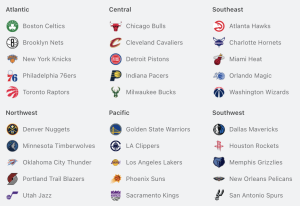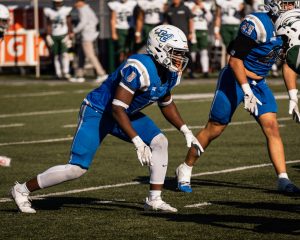Opinion: What Is Sportswashing and Why Is It Happening
October 23, 2022
When the average sports fan tunes into a game, match or event, they usually aren’t doing so with a political agenda in mind. In fact, many fans tune in specifically to escape from ongoing political issues.
Focusing on the game being played within the lines is a rational and legitimate form of self-preservation for an individual in an otherwise exhausting, politically-dominated media environment.
However, while sports fandom can provide an amazing outlet for individuals looking for artificial drama and entertainment, it also provides an easy opportunity for manipulation.
Ultimately professional sports are businesses above all else. Athletes, executives and staff must make business decisions that affect them and their families’ livelihoods. Those who have the money can purchase priceless advertising for any narrative they want.
In sociology, the definition of power is when one individual or group can compel another to do something that they otherwise wouldn’t do. For decades, professional sports have produced many examples of this dynamic.
From the 1936 Olympics in Nazi Germany to the 1974 “Rumble in the Jungle” paid for by dictator Mobutu Sese Seko, history has shown that states with image issues see unrivaled value in sports.
While traditional forms of propaganda such as films or literature are overt in nature and straight to the point, sports are different. They are subtle. They reach the public when their guard is down. They speak to something that many people hold sacred, their fandom.
In democratized nations in the world, they connect to a broader ideal. There is a notion that the egalitarian nature of regulated, competitive sports has the power to transform non-democratic states into ones that value individual rights and freedoms.
While this is a nice idea and may have, at least to some extent, been in the back of David Stern’s mind when fostering the NBA’s relationship with China, above all else it was about business.
Through the two decades since the Houston Rockets selected Chinese center Yao Ming first overall in the 2002 NBA draft, the league has gone all in on tapping into the market that is home to approximately 1.4 billion potential fans.
Using exhibition tours throughout the country, state-sponsored broadcasts of NBA games and a heavy dose of marketing, the NBA has become massive in China. By some metrics, the NBA is more popular in China than in the United States.
Aside from the clear-cut relationship that the league itself has with China, many team owners have their own investments in the country that further cement the relationship. All in all, the NBA and its most powerful executives have billions of dollars tied up in the Chinese market.
This may sound like a simple win-win, and a successful capitalist venture, but politics add a complicated layer to the business relationship.
Out of the four major U.S. sports leagues, it is fair to say that the NBA has been the most outspoken when it comes to social justice at home. Besides the use of statements, slogans and logos to express support for the Black Lives Matter movement over the past couple of years, the NBA, its team owners and players have put their money where their mouth is.
Prominent owners such as Michael Jordan and Joe Tsai, along with the league itself have pledged hundreds of millions of dollars to the social justice movement. However, the extent of that movement is not universal or without exception.
When human rights have been abused by the Chinese government, or the sovereignty of a state is ignored based on the “one-China” policy, calls for justice from the NBA and its representatives cease.
It’s not hard to figure out why this is the case. You only must look back a couple of years. In 2019, when Daryl Morey, then general manager of the Houston Rockets, tweeted out an image in support of protests in Hong Kong, a very touchy issue for the Chinese government, those billions of dollars invested in China looked to be in jeopardy.
The entire NBA, including the Rockets, left Morey out on his own. Each put out statements putting distance between themselves and anything remotely critical of China, calling Morey’s tweet “regrettable.” The Rockets considered firing Morey. Within days, he deleted the tweet and apologized.
Even with the NBA totally capitulating, the Chinese government still chose to flex the leverage it holds over the league. For three years, all NBA broadcasts were banned from Chinese media, and the business relationship was heavily strained.
The NBA stayed the course, though, and by keeping all its representatives tight-lipped on any potential criticism of China, the league has won back its position of favor.
One tweet. That’s all it took.
The NBA has worked its way into a hostage situation with China. In the future, the Chinese government can likely rest assured that no matter how horrible it may act, the NBA won’t say a word.
Under these circumstances, the Chinese government can at worst count out any influential person involved in the NBA as a potential critic, and at best count them as a public ambassador.
Some may have thought the export of basketball would involve the export of democratic ideas, but something different happened. Basketball was exported, and censorship was imported.
When considering examples of sportswashing that have occurred over the last century or so, the NBA’s relationship with China feels unique.
Unlike other instances such as the Olympics which have been designed to passively distract from a bad image, this is a situation where a nation is enlisting athletes to take an active role in dismantling the bad image.
In an almost ridiculously transparent attempt to do the same, the Saudi Arabian government has thrown hundreds of millions of dollars at the world’s best golfers to run public relations for the human-rights-abusing regime.
Unlike the NBA and China, where the league already existed, the LIV Golf Tour was created for sportswashing. Any other explanation just doesn’t make sense.
The tour, which is owned almost directly by Crown Prince Mohammed bin Salman, is backed by more than half a trillion dollars of Saudi money.
The tour has thrown big money at big names. Prominent golfers like Phil Mickelson, Dustin Johnson, Bryson DeChambeau, among others, were paid millions to compete in tournaments with guaranteed prizes.
LIV Golf was willing to sign Tiger Woods, a golfer who is past his prime and practically retired, for almost a billion dollars.
The Saudi government has no need to make a profit on this venture into golf and seemingly has no shot of doing so. Based on the format and the golfers being signed to the tour, it isn’t about a high level of competition either.
LIV Golf did not offer Tiger Woods that much money because he would play well. They offered that kind of money because of his value as a spokesperson.
The Saudi Government sees value in having golf’s biggest names in a situation similar to the NBA and China.
While Phil Mickelson has claimed to believe in the power of the great game of golf as a tool to spread good in the world, it seems just as likely to turn the other way around.
The great game of golf is being used to dismantle the idea that the Saudi Arabian Regime has ever done anything other than good.
While most people may feel that they would always do the morally right thing, power is a very real thing.
In these cases, governments have leveraged enormous amounts of money to coerce leagues and individuals to do or say things that they wouldn’t have done otherwise. The lines between a harmless escape and a political battleground are as blurry as ever.



